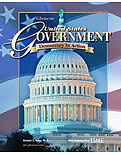1 A) foreign governments within their own borders. B) all levels of government in the United States. C) acts of state and local governments. D) congressional actions. 2 A) reference to "unalienable rights." B) Preamble. C) definition of citizenship. D) due process clause. 3 A) using public tax money to support one particular religion. B) opening daily sessions of Congress with a prayer. C) having any contact with any church or religious group. D) administering oaths of office in the name of God. 4 A) benefit students of non-Christian religions. B) have a clear, secular, nonreligious purpose. C) in its main effect inhibit religion. D) encourage "excessive government entanglement with religion." 5 A) bad tendency doctrine. B) preferred position doctrine. C) alternative channels of communication. D) "clear and present danger" test. 6 A) calling a dance partner clumsy when he or she steps on your toe. B) naming people who bribed a mayor in a newspaper column. C) telling customers that a baker puts insects in the raisin bagels. D) falsely accusing a classmate of cheating in a letter to the teacher. 7 A) Near v. Minnesota. B) New York Times Co. v. United States. C) Sheppard v. Maxwell. D) Nebraska Press Association v. Stuart. 8 A) New York Times Co. v. United States. B) Sheppard v. Maxwell. C) Nebraska Press Association v. Stuart. D) Richmond Newspapers, Inc. v. Virginia. 9 A) enter the grounds of a county jail. B) disrupt classes in nearby schools. C) interfere with other citizens using the streets. D) interfere with trials in nearby courthouses. 10 A) depriving a business of its customers is unconstitutional. B) picketing without a labor dispute is prohibited. C) peaceful picketing is a form of free speech. D) people cannot cross a labor picket line.





